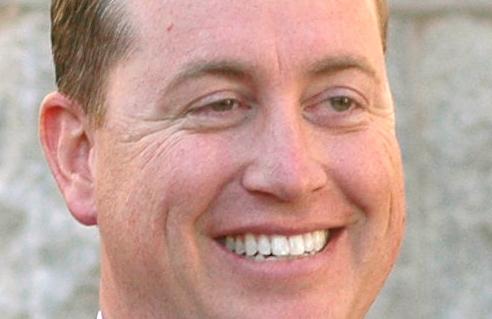PHOENIX — State Treasurer Jeff DeWit said Tuesday a plan to settle the school funding lawsuit with trust land proceeds is irresponsible.
And he said it’s also likely illegal.
DeWit said the additional withdrawals for the next decade called for in the proposal being pushed by Gov. Doug Ducey would mean huge losses in revenues available to schools beyond that. He said that undermines the purpose of Congress giving Arizona 10 million acres of land in 2012 to set up a permanent trust.
DeWit said taking the fiscally risky move is unnecessary. He said the state has more than enough money in the bank to finance the deal — especially with schools willing to settle for less than a judge said they actually are owed.
The treasurer’s opposition drew a sharp response from gubernatorial press aide Daniel Scarpinato.
“We are not endangering the trust,” he said. And Scarpinato said he believes meeting the current need of schools is exactly why the trust was set up a century ago.
Hanging in the balance is whether lawmakers will vote this week to approve a deal settling the lawsuit filed against the state five years ago by schools. They said lawmakers ignored a 2000 voter-approved mandate to increase state aid annually to compensate for inflation.
A trial judge agreed, ordering the state to come up with more than $330 million, a figure the Arizona School Boards Association said equals about 72 cents on each dollar owed. The deal also resolves a separate question of $1.3 billion in unpaid aid for prior years.
The lion’s share of the 10-year package comes from boosting the distribution from the land trust from the current 2.5 percent of the value of the fund — about $87 million a year — to 6.9 percent.
Scarpinato said it makes sense to use the fund.
“The founders designated this money for our schools,” he said.
“The schools have needs,” Scarpinato continued. “We’re going to get this money to the schools.”
But DeWit said that additional nearly $2.1 billion withdrawn between now and 2026 ignores what happens next.
The fund, which is now worth about $5 billion, would be worth $9.6 billion in 2026 by keeping the withdrawal rate at the current 2.5 percent; going to 6.9 percent for a decade would leave it at $6.5 billion.
The difference would be felt in 2026.
Without dipping deeper into the fund, schools that year would be entitled to $177 million; adopting this plan would put state aid to schools at just $100 million.
And the difference is even more pronounced the farther out you go.
Aides to DeWit said giving schools an extra $2.1 billion from the trust over the next decade translates into them getting $6.8 billion less in the 40 years that follow. And taking that out over 90 years pushes the total loss to schools to $76 billion.
Then there’s the legal issue of the fact the trust fund was set up by Congress.
“The whole point of the congressional oversight of this is to ensure that we never touch a penny of the principal,” he said. What that also means, said DeWit, is that boosting the distribution needs not just voter approval next May but also the consent of Congress.
Richard Stavneak, staff director of the Joint Legislative Budget Committee, insisted that’s not the case. He said legislators have tinkered with the formula before without going back to Washington, calling it “settled law” that further federal legislation is unnecessary.
DeWit, an elected official, disagreed.
“Somebody’s going to sue,” he said, saying this plan is far different than what has occurred before.
“I’m going to do everything in my power to protect the school endowment trust,” DeWit said. But pressed on whether he would be the plaintiff in such a case, he said, “I can’t answer that question yet.”
He said, though, that it shouldn’t even be necessary to risk a lawsuit.
“We have an extra $300 million coming in,” he said. In fact, the state ended the last fiscal year with $322 million in the bank, not counting $460 million in the “rainy day” fund.
“We can use the extra money to settle the schools’ lawsuit right now, especially considering how low the plaintiffs are now showing that they’re willing to go,” DeWit said. And he chided Ducey for backing the hit to the trust account.
“It seems odd that we have a governor’s office seemingly upset that we have all this extra revenue coming into the state, that the economy’s doing well,” the treasurer said. “We have them trying to suppress those numbers and get the deal pushed through quick before everyone realizes there is extra revenue that’s come in that could be used to settle the school lawsuit that wouldn’t involve raiding the trust fund.”
Scarpinato said it’s not that simple.
“The state has a lot of needs” for that money, he said, like public safety. “So why leave money in the bank on Wall Street that is for our K-12 schools at a time when they need the most?”
DeWit, however, said proponents want to use trust dollars to settle the lawsuit to leave the extra funds that are available “to spend on whatever they choose to spend that money on.” And those options, said DeWit, could include allowing Ducey to fulfill his campaign promise to cut taxes every year he is governor.
To this point the group most willing to listen to DeWit are not fellow Republicans but the Democrats.
House Minority Leader Eric Meyer said his caucus shares the belief there is enough money to settle the lawsuit without tapping the trust. And Meyer said his staff attorneys agree with DeWit that boosting the withdrawal rate to 6.9 percent without congressional consent would be illegal.






